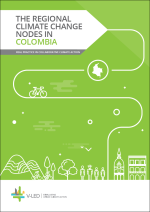Climate Action Starts with Dialogue

IKI project “V-LED” offers dialogical approach to multi-level climate governance.
In December 2016 representatives of more than 190 countries came together in the Moroccan city Marrakech to discuss the implementation of the Paris Agreement. The big question was how the national climate commitments (NDCs) will be translated into local action. Today, two months after the conclusion of the United Nations Framework Convention on Climate Change (COP22), there remains a gap: How can we ensure that NDCs are seizing upon subnational opportunities for action?
This is where the V-LED project (Vertical Integration and Learning for Low Emission Development) comes in. Since 2015, the project is supporting the governments of Kenya, South Africa, Viet Nam and the Philippines to strengthen horizontal and vertical policy coordination processes and capacities for local climate action.
These four countries are vulnerable to the negative impacts of climate change and, at the same time, have growing economies with significant mitigation potential. They are already implementing significant climate efforts to link up with.
In 2016 the project organized seven vertical climate dialogues, four good practice exchanges, seven trainings and has planned many more events in 2017. The project collects and shares the experiences from the countries with each other through knowledge exchange, regional workshops in Africa and Asia and a study tour.
A key idea of the V-LED project is that coordination between actors and levels starts with getting people together to talk. This approach rests on two core ideas:
1. Action starts with dialogue
As the basis of coordination, dialogue opens up potential for collective climate action. If people are allowed to constructively spend time together, to listen to and interact with each other in a meaningful way, dialogue can help build trust, coordinate efforts, initiate learning, inspire innovation and generate a sense of ownership of solutions. Like this, inclusive dialogues can produce better coordination and multi-level strategies capable of addressing the collective climate challenge.
V-LED engages national, provincial and municipal government levels in vertical climate dialogues and horizontal good practice exchanges to talk about tangible climate solutions. Recently in South Africa, municipalities and national government representatives met to discuss the role of cities in the implementation of NDCs. In the Philippines, city governments shared hands-on solutions for sustainable waste management in an interactive multimedia exhibition.
2. A different way is possible
It often occurs, that workshops or meetings, though well-intended and necessary, tend to forget the vast human resources sitting in a room and waste the huge potential with the same formats that are well-known and convenient. Learning sometimes involves getting out of a comfort zone, walking around, taking time to reflect or building something with hands. During the third United Nations Conference on Housing and Sustainable Urban Development (HABITAT III) in Quito, V-LED organised a workshop in the actual sense of the word: participants walked around in the room, found an interesting group to join and built something together, both through discussions and with their hands.
The Berlin-based think tank adelphi is leading this four-year project along with an international consortium of organisations: UN Habitat, One World, Sustainable Energy Africa, and the Institute for Law and Environmental Governance. The project is supported by the Federal Ministry for the Environment, Nature Conservation, Building and Nuclear Safety as part of its International Climate Initiative (IKI) and implemented between 2015 and 2019.
The link has been copied to the clipboard
Contact
IKI Office
Zukunft – Umwelt – Gesellschaft (ZUG) gGmbH
Stresemannstraße 69-71
10963 Berlin




![[Translate to English:]](/legacy/Bilder/2021/20210601_v-led_south_africa_Thumb.jpg)



![[Translate to English:] Die Petronas-Türme im Stadtbild Kuala Lumpurs; Foto: Unsplash/Ishan](/legacy/_processed_/f/8/csm_180215_ishan-seefromthesky_Header310_661e6fc5b9.jpg)
